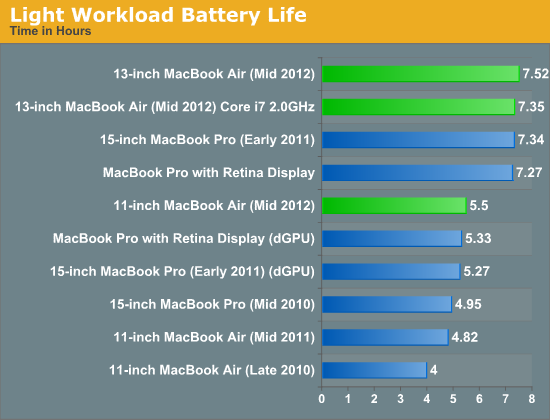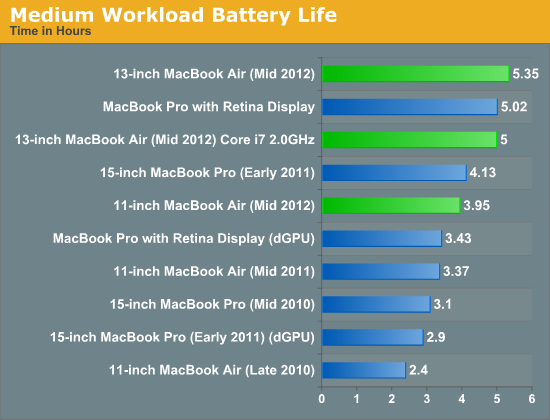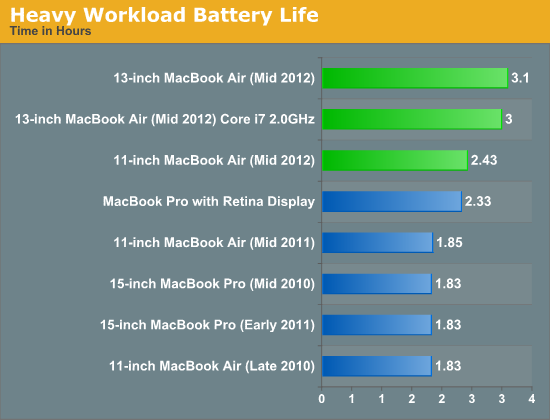The 2012 MacBook Air (11 & 13-inch) Review
by Anand Lal Shimpi on July 16, 2012 12:53 PM EST- Posted in
- Apple
- Mac
- MacBook Air
- Laptops
- Notebooks
Battery Life
The MacBook Air sees no increase in battery capacity over the previous generation, as a result any improvement in battery life boils down to what we get from Ivy Bridge. I'm stuck rebuilding the battery life results database from scratch now that I've built a new suite of tests for OS X. I've run all three generations of 11-inch MacBook Air through the new suite but I don't have numbers for the older 13-inch MBAs unfortunately. As I mentioned in the rMBP review, the new suite is designed to give accurate data points at three usage models: one light, one medium and one heavy. The combination of all three should give you an idea of the behavior of these systems on battery.
Across the board battery life of the 13-inch MacBook Air is actually quite similar to the Retina MacBook Pro, just from a much smaller battery and without the variability introduced by the rMBP's discrete GPU. If anything the lack of a discrete GPU makes using the MacBook Air much simpler from a battery life perspective. As much as I love Cody Krieger's gfxCardStatus application, it's nice not having to keep an eye on it to see if something silly has triggered the dGPU.

Under light usage the new 13-inch MacBook Air is easily able to meet Apple's claim of 7 hours of battery life. The 11-inch model does the same to its 5 hours rating, beating it by the same 30 minute margin as the 13.

The medium workload thins the herd a bit, with the 13-inch Air still coming out on top but at 5.35 hours. The 11-inch Air drops below 4 hours, which is an improvement over the previous two generations of 11-inch Airs. Once again we see an example of Ivy Bridge doing better than Sandy Bridge when it comes to mobile power usage.

Under heavy load is really where we see Intel's 22nm process deliver the gold. Here both of the 2012 MacBook Air models do very well. With the 13-inch MBA significantly outpacing even the rMBP with its 95Wh battery, while doing the exact same amount of work.
The 13-inch MacBook Air continues to be Apple's best notebook for those who care about battery life. The 11 offers portability but you do take a significant hit in battery life.










190 Comments
View All Comments
ShadeZeRO - Monday, July 16, 2012 - link
I'm curious as to why you haven't held the apple line to the normal scrutiny typically found in your other notebook reviews.I've noticed a certain level of bias on most review sites most likely caused by the sudden trend in popularity of Apple products.
If this was branded differently I'm positive the display for one would have been ridiculed as a poultry offering.
Overall a fine review, it's not on the level of a gizmodo/engadget/etc apple circle jerk so I still respect it.
/rant
KoolAidMan1 - Tuesday, July 17, 2012 - link
He criticized the display and compared it unfavorably against other ultrabooks that use IPS panels. It is one of the few points of criticism, but its there. Is your problem that he doesn't say that the MBA is a complete piece of trash?Anand gave a very well balanced review as per usual.
Super56K - Tuesday, July 17, 2012 - link
I would gladly take a 1440x900 TN display like the Air's in a 13" Sandy/Ivy Bridge Windows laptop.notposting - Tuesday, July 17, 2012 - link
Paltry offering.Unless they are offering up some turkeys, ducks, and chickens for sacrifice.
Alameda - Tuesday, July 17, 2012 - link
First of all, Anand, I want to tell you that you've once again written up an excellent review, and I'm very impressed with your thoroughness and clarity. I just purchased a 2011 MBA, so of course I read your review to justify that I made the right decision. While I understand the need for benchmarks and the real-world tests such as Photoshop and so forth, I think most people do not use their computers the way your tests imply.In my daily use, the performance bottleneck I experience is when making a Time Machine backup, which the new machines should improve upon -- USB 2.0 is very slow, and Thunderbolt drives are too expensive. USB 3.0 is the right solution for most users. I would also like to see networking tests. This machine needs wifi to work, and there's a lot of performance variance from one 802.11n to another. Last, sincecthe RAM is soldered, adding guidance about memory use would be useful. On my MBA, if I open all of my applications at once (except VMWare), I use less than 2 of my 4 GB of RAM. So it seems to me that 8+ GB only matters if you have a specific power-user need, particularly in a simultaneous Mac/Windows setup, but for most users, 4 GB and the stock CPU exceeds what you can use.
I personally think these sorts of real world tests would make your reviews better reflect what most users actually do. I also feel that many people want to make excuses for taxing a machine to its limits, but we simply don't have such issues in actual use.
name99 - Tuesday, July 17, 2012 - link
Basically 2GiB is tight for pretty much any OSX user nowadays, but swapping on even the 2011 SSDs is fast enough that you don't really notice it. You can live it, but you will notice occasional pauses.You want 4GiB if you tend to keep a lot of browser windows open. Safari is a pig in this respect (hopefully improved somewhat in ML) and Chrome is not that much better.
My collection of always-running apps is Finder, Mail, iChat, Skype, iTunes and Safari; something like this is, I think, pretty standard across most users. That, with 20 or so browser windows, will fit OK in 4GiB, but will start obviously paging if you add a few more apps, eg throw in Word or Excel or an Adobe app.
(
Where does it go?
Essentially the OS is using about 500MB for misc [process management, memory management, network buffers, that sort of thing] and about 1GB for file buffers of various sorts. Of the 2.5 GB that's left, the worst offenders:
WebProcess, essentially the guts of Safari, is currently using 1.2GB which is pathetic, the actual Safari process, basically UI, is using 200MB, also pathetic, and iTunes is using 530 MB --- TRULY pathetic, but what else would you expect from, iTunes, apparently the team to which Apple retires their most doddering and incompetent programmers.
)
For most people, however, I'd recommend 8GiB purely because
- it's not that much more in cost.
- you may not need it now, but you're future-proofing yourself since most normal people use their laptops for at least 3yrs before replacing them
- the extra retail value when you do retire it is probably worth more than the extra cost now --- just think of the comparable desirability today of a 2GB vs a 4GB 2010 MBA.
Freakie - Tuesday, July 17, 2012 - link
I'd definitely agree with you that 8GB really should be what most people get. Even though they wont know or understand the difference, it makes a difference in how much they will enjoy any computer, PC or Mac. You just never know when someone will do something that eats up a ton of RAM, whether it be running a game without closing their browser, or opening up 100+ browser tabs, 4 word documents, and 4 excel books (my girlfriend does that a lot, and it makes her 8GB rather unhappy).And if you have an Windows computer with a 64bit install, more RAM is even more important for getting the best possible experience. While I can't say while OSX seems to have such RAM hungry programs that don't offer performance gains for so much usage, I can say that I put specific 64bit programs on my Windows laptop knowing that they will perform better and be able to use more RAM and use it more effectively. My 64bit Firefox browser is a great example of that. I don't mind it using 2-3GB of RAM because I have a crap ton of stuff open, multiple flash based videos, a flash game, ect... because it's just a nice experience. Not to mention this 64bit version is way faster than the regular one :P Regular users could be having these nice experiences too if the general consensus on what a good amount of RAM is would increase.
On a side note... I'm thinking of going up to 16GB on my laptop, maybe 24GB... Just because I'm greedy :P Might even go the full 32GB and put a RAMdisk... who knows! So many possibilities when you have MORE RAM!
phillyry - Tuesday, March 26, 2013 - link
'Future proofing' = illusionHere's your future proofing. Buy what you need now of will likely need in the near future and save your pennies (or, in this case hundreds of dollars with of upgrades) for your next upgrade. And by upgrade, I mean your next laptop or whatever the hell else you want to do wig your money. Why leave an extra $100 lying inside a computer chassis in the shape of some soldered on RAM, if you can keep that money in your bank account and buy whatever else you want or, maybe even, actually need with it.
Really, the upgrades should only be for the hardcore users and should not be a concern for most people.
name99 - Tuesday, July 17, 2012 - link
What sort of compression does Sandforce use?More specifically, I imagine that within a file they use some sort of LZ variant --- it's easy, it's known to work well for this sort of problem, and there's hardware to handle it.
More interesting is the question of what sort of cross-file de-duplication they use. The obvious thing would be some sort of hash of each 4kiB block to something like a 128b signature, then compare each incoming block to that map. But that would require an in-memory table of hashes that would be of order 256MiB in size for a 64GB drive (and twice that for a 128GB drive), which, while obviously technically possible, doesn't seem to match their actual hardware setup. You could drop the hash to 64b, at the cost of more frequent collisions (and thus having to waste time reading the drive to compare with the incoming block) and that would halve your table size --- again possible, but still looking like it uses more RAM than they have available.
So what's the deal? They don't actually do cross block de-dup? They do it in some fashion (eg using larger blocks than 4kiB) which, while it works, is not as optimal for small files?
desmoboy - Tuesday, July 17, 2012 - link
Excellent Review Anand. Do you have a explanation why the 13" MBA i7 is 28 sec slower in the iMovie '11 (Import + Optimize) benchmark than the i5 version? Seems bit strange when the i7 scores higher on every other of your benchmarks (as one would expect)